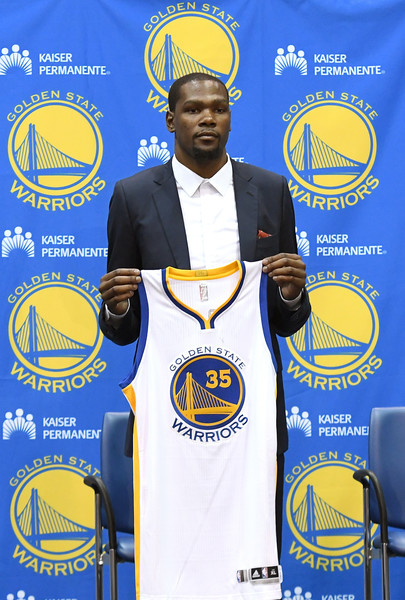Just 20 years ago, an NBA Player receiving a $100 million contract was considered foreign territory. In the summer of 1996, only three players had deals that saw them surpass nine figures – Shaquille O’Neal, Alonzo Mourning, and Juwan Howard. But now, it seems that everybody is closing in on being a $100 million dollar man, thanks in large part to a cap increase of $720 million dollars this offseason.
Furthermore, what is most startling is that at least back then, the large contracts went to marquee talent. Now, we have glorified role players who will be making money usually reserved for the upper echelon of players.

For example, it has reported that the Atlanta Hawks‘ small forward Kent Bazemore has resigned with the team to the tune of 4 years and $70 million dollars, which has been categorized as blatantly absurd by several basketball experts.
In all honesty, the 4th-year player out of Old Dominion is serviceable but he is certainly not believed to be worth $17.5 million a year. The overvaluing of mediocre talent has become ludicrous and the contracts are laughable.

One team that has quickly put to use the extra cash is the Memphis Grizzlies, who have spent a whopping $250 million already this summer including giving an absurd (and in this writers’ estimation, undeserved) 5-year, $153 million deal to the oft-injured and underachieving Mike Conley. For those keeping track at home, this makes him the highest paid player in the league on a per-year average.
What the consensus of basketball minds would call outrageous, is just a drop in the bucket to general managers who are shelling out $15 to $18 Million a year to mediocre wingmen like Evan Turner and Evan Fournier.
Another trend that has taken the league by storm over the last few free agency periods is top level talent such as the likes of LeBron James, Rajon Rondo, Dwayne Wade, and Kevin Durant (who will be discussed further in this piece) signing 2-year deals with player options in the 2nd year that essentially allow them to get the maximum amount allowed by the league’s generous salary cap for one year.
This gives them the chance to just opt out the following season when the per-year average will be at mind-numbing all-time high, with some players rumored to be able to look forward to upwards of $40 million a year.

However, the most alarming free agency move by far was the shocking betrayal of the Oklahoma City Thunder by Durant. The “easy money sniper”, as he has become known on Instagram, just inked a 2-year, $54 million dollar deal with the two-time defending Western Conference champion Golden State Warriors.
The acquisition of Durant creates yet another “super team,” a term that has become all to0 familiar in today’s NBA, and it has been common practice since the beginning of the decade to build a team of several All-Stars to win a championship and sustain excellence.
Now this is something that was inevitable since the dawn of free agency. It has become increasingly difficult to keep perennial contenders together. Gone are the dominant days of Lakers and Celtics of the 80’s and the Bulls of the 90’s. Teams just do not stay together anymore, and players change teams like a couch potato changes channels.
How can one really debate this behavior? What with the allure of winning a championship coupled with the fact you can be paid handsomely while doing so, it should not be an overwhelming mystery as to why this has become the most popular decision made by the modern professional basketball player. However, what does this mean for the little guy, the small franchise that could from the minuscule market?
Unfortunately, this type of free agency renders those franchises irrelevant. It is bad enough that there are teams that we all know have zero shot at reaching the playoffs, there are even teams that are in the middle of the pack that may make the playoffs but are more pretenders than contenders.
Numbers never lie, and one stat that can not be debated is, there has only been one team in NBA history – the 1999 New York Knicks – to make the Finals as an 8 seed. It has been over 2 decades since a team seeded lower than 6th ever won a title, that of course being the 1995 Houston Rockets.
In short, more than likely, if a team is not among the top 3 seeds, they will probably be going home early. This trend has become even more common in today’s league where a handful of teams stay just above the invisible line of relevancy.
For example, the Hawks have teetered around the 50-win mark for the past six seasons, and even topped the 60-win plateau just two years ago before falling back to earth. However, they have absolutely no realistic chance to hoist the trophy, especially in the east were one King James has enjoyed a lengthy reign on top.
This is a sad reality for up to 12 teams in the league every season. And what is the explanation for these events, you may ask? In short, the influx of highly-paid role players to mediocre teams and the willingness of superstar players to team up for a shot at a dynasty does nothing but erode the league’s competitive balance.
The bad teams will stay at the bottom end of the totem pole, and the middle of the road teams will continue to fall just short of top tier status while a handful of teams will battle for the ultimate prize.
The super teams are destined to remain the face of the NBA for years to come, since the lack of competitive edge from the players and the desire to play with friends has made sure of that. Since the aforementioned Rockets of 1995, no team seeded less than 3rd has won a title.
Big names playing with other big names and staying on top for long stretches of time have caused the NBA to lose its cache and the drama it once had. The fact is that out of 30 teams last season, only 6 were at least 10 games over .500.
It can even be argued that the NBA’s regular season as a whole has been rendered meaningless and woefully mundane. Except for a few key match ups here and there, like the annual Christmas game, you can argue that there is no point in even watching the sport until the snow outside has started to melt, and the playoff teams are all but a foregone conclusion by the All-Star break.
Fans of the league may have to get ready for irrelevant basketball that will surely not become even remotely interesting until Memorial Day.
